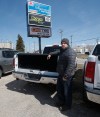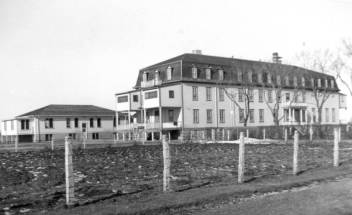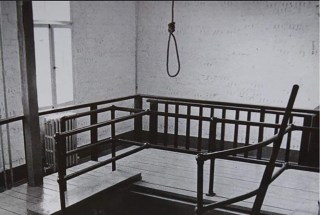Three charged with trafficking catalytic converters after police raid scrapyard
Read this article for free:
or
Already have an account? Log in here »
To continue reading, please subscribe:
Monthly Digital Subscription
$0 for the first 4 weeks*
- Enjoy unlimited reading on winnipegfreepress.com
- Read the E-Edition, our digital replica newspaper
- Access News Break, our award-winning app
- Play interactive puzzles
*No charge for 4 weeks then price increases to the regular rate of $19.00 plus GST every four weeks. Offer available to new and qualified returning subscribers only. Cancel any time.
Monthly Digital Subscription
$4.75/week*
- Enjoy unlimited reading on winnipegfreepress.com
- Read the E-Edition, our digital replica newspaper
- Access News Break, our award-winning app
- Play interactive puzzles
*Billed as $19 plus GST every four weeks. Cancel any time.
To continue reading, please subscribe:
Add Free Press access to your Brandon Sun subscription for only an additional
$1 for the first 4 weeks*
*Your next subscription payment will increase by $1.00 and you will be charged $16.99 plus GST for four weeks. After four weeks, your payment will increase to $23.99 plus GST every four weeks.
Read unlimited articles for free today:
or
Already have an account? Log in here »
Hey there, time traveller!
This article was published 17/06/2022 (1268 days ago), so information in it may no longer be current.
Three men are facing charges after police targeted a scrapyard in a four-month investigation — dubbed Project Precious — into sales of stolen catalytic converters, as thefts skyrocket in Manitoba.
Heavily armed officers from the Winnipeg police tactical support team were involved in a raid at a lot in the Rural Municipality of Springfield, just east of the city, on June 2.
City police spokeswoman Const. Dani McKinnon said people at the scrapyard were suspected of buying “large quantities” of stolen converters and trafficking them for a “lucrative” sum.
“Over the four months, (officers) learned that (scrapyard) was a prevalent player in taking these stolen catalytic converters and then selling them to a third party, so that’s how both the buyer and seller were profiting,” McKinnon said at a news conference Friday. “Sellers were profiting quite well.”
Converters are part of a vehicle’s exhaust system, converting pollutants to less toxic material. They’re valuable because they contain trace amounts of precious metals such as platinum, palladium and rhodium.
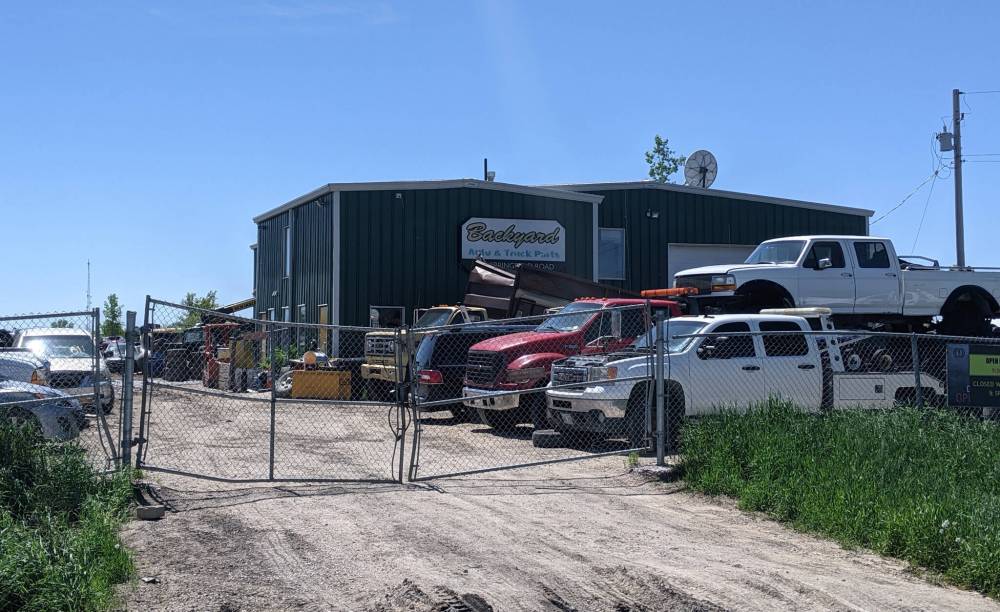
Witnesses said they saw police at Backyard Auto and Truck Parts, located at 2216 Springfield Rd. between Day and Redonda streets, around 10 a.m. on June 2.
A man, who asked not to be named, saw officers with rifles while unmarked police SUVs were parked in front of the scrapyard.
“I had no idea what was going on,” he said.
Photos provided to the Free Press show tactical police at the scrapyard and an officer using a vehicle’s hood to support his rifle at a neighbouring property.
The scrapyard’s gates were locked Friday. Phone calls were not answered.
Officers allegedly found 13 converters during the raid. Police alleged the business was involved in sales that dealt with “multiple” converters at a time.
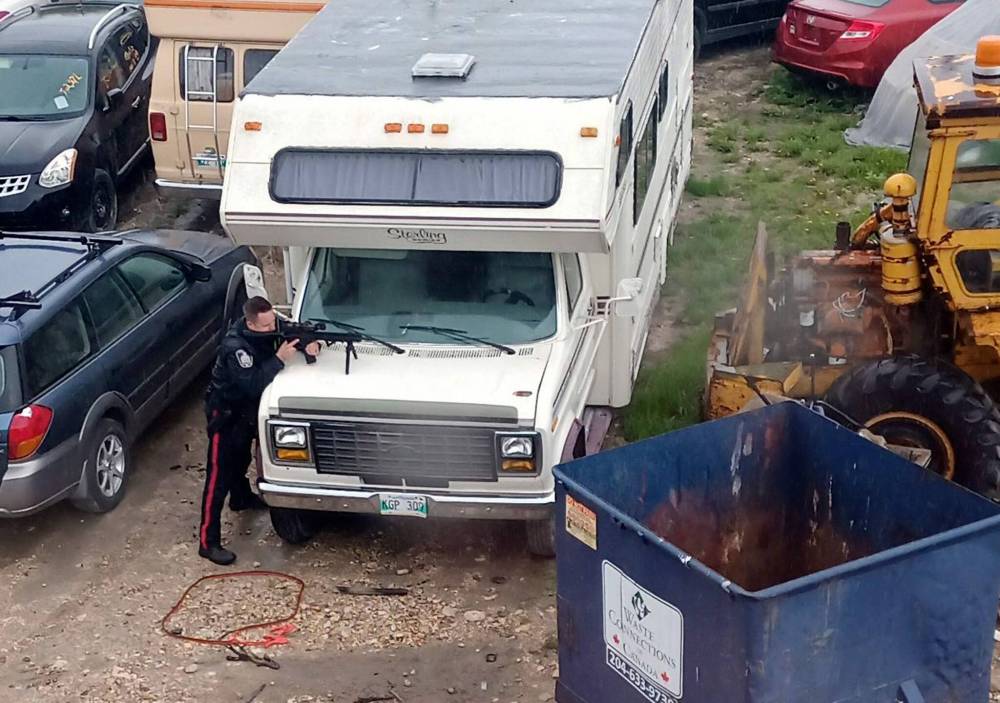
McKinnon said police seized documents for transactions, $12,500 in cash, nine grams of cocaine with a street value of $900, about 300 grams of cannabis worth $3,000 and two grams of magic mushrooms valued at $300.
Tactical officers were involved in the raid because the scrapyard is large and “it’s always better to be safe and well prepared,” she said.
Two Anola men, aged 35 and 48, are facing a range of charges related to stolen property and drugs. Both were released on a notice to appear in court.
Winnipeg resident Robert Jeffries Lytle, 43, was charged with possession of property obtained by crime under $5,000 and failing to comply with a release order. He was held in custody.
Lytle has convictions for possession of property obtained by crime, theft, assault with a weapon and drug possession, court records show.
He faces unrelated and outstanding charges of operating a motor vehicle while prohibited and dangerous operation of a motor vehicle for an alleged incident Sept. 18, 2020.
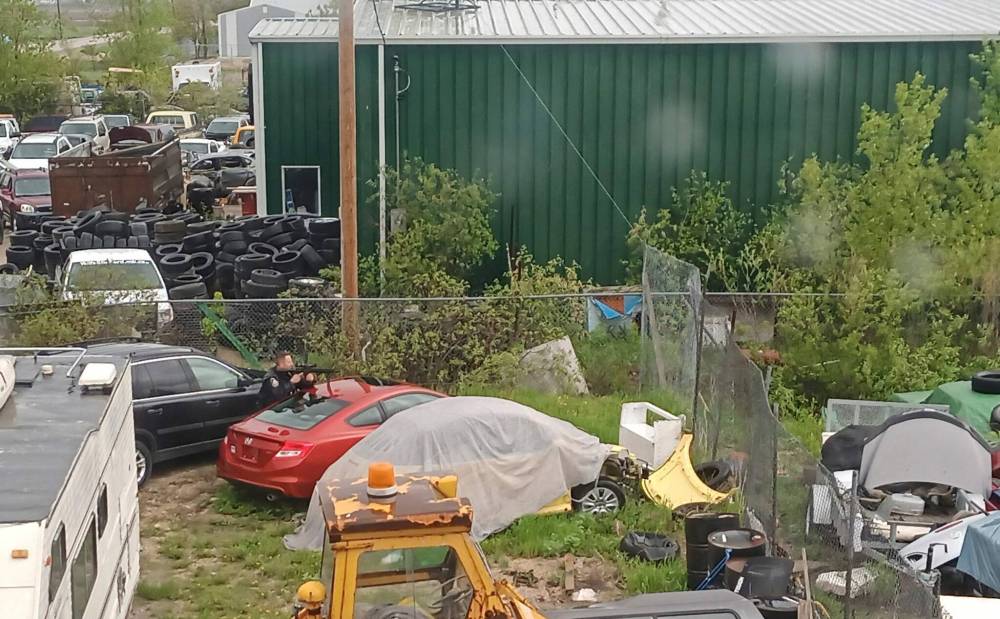
The Winnipeg police property crime unit led Project Precious and the Springfield Police Service assisted.
The probe was given its name based on the precious metals that make converters so profitable.
Springfield police said it first became suspicious of a business about 18 months ago. Being a small service with only four members, it didn’t have enough resources to do a large-scale investigation on its own.
It turned to the RCMP and Manitoba Public Insurance to pursue investigative avenues. Months later, Project Precious “led police to the same business, confirming everyone’s suspicions,” said Springfield police in a release.
For theft victims, it can cost hundreds or more to replace a converter. For thieves or traffickers, sales of stolen converters can net hundreds or thousands of dollars, with thefts in Winnipeg quadrupling in the last year, said McKinnon.
MPI figures show theft-related claims in Manitoba have soared since 2020, when there were 336.
MPI reported 1,564 claims in 2021 and 1,248 in the first five months of 2022.
A total of 336 incidents were reported to Winnipeg police in 2020, followed by more than 1,600 in 2021.
Police are working with the province and MPI “on the best way to target the thefts,” said McKinnon.
“It isn’t always very easy to catch the thieves as it’s happening,” she said, noting how difficult it is to prevent thefts. “This is a crime of opportunity and, unfortunately, if your vehicle is targeted it’s nothing that you did wrong.”
A CAA Manitoba spokesperson said there isn’t a “foolproof way” to secure a converter to a vehicle.
If possible, the spokesperson said, people should use surveillance cameras or motion-sensor lights, or park in a locked garage to deter thieves.
Drug addiction is fuelling the rise in thefts, police said.
“Property crime is an opportunity to help feed the addiction in terms of getting money for what you’re trading in,” said McKinnon. “This was a means of money for people likely involved in methamphetamine and other drug (addictions).”
She assured the public that officers are committed to tackling the problem. The service would welcome legislation with a measure that requires unique identifiers to be etched onto converters to make it easier to identify owners.
“Until there is something to trace a stolen catalytic converter back to an owner’s vehicle, there’s not really any way to say this belongs to any vehicle,” said McKinnon.
NDP MLA Jim Maloway has introduced a private member’s bill that would require auto dealers to etch a vehicle identification number on the catalytic converters of every new and used vehicle it sells.
In December, the province introduced the Scrap Metal Act, which targets sellers and buyers to halt trafficking of stolen auto parts.
Sellers will be required to show government-issued identification and a photo of their face, and write down a description of the piece of scrap metal and how they acquired it.
“It isn’t always very easy to catch the thieves as it’s happening. This is a crime of opportunity and, unfortunately, if your vehicle is targeted it’s nothing that you did wrong.” – WPS spokeswoman Const. Dani McKinnon
Scrap dealers will be barred from purchasing the metal without the information.
For some items, dealers will be required to record a seller’s licence plate number. The information must be stored for at least two years.
Police must be notified of any suspected stolen parts. The law would allow officers to inspect scrapyards and carry out enforcement of the act, also known as Bill 9, without a warrant.
In a statement, Justice Minister Kelvin Goertzen said the recently passed act is expected to be proclaimed “very soon,” as regulations are being finalized.
“I appreciate the work of the Winnipeg Police Service, together with MPI and Manitoba Justice, in working to stem the theft of catalytic converters, which is a problem across North America,” he said.
chris.kitching@freepress.mb.ca
Twitter: @chriskitching
As a general assignment reporter, Chris covers a little bit of everything for the Free Press.
Our newsroom depends on a growing audience of readers to power our journalism. If you are not a paid reader, please consider becoming a subscriber.
Our newsroom depends on its audience of readers to power our journalism. Thank you for your support.




